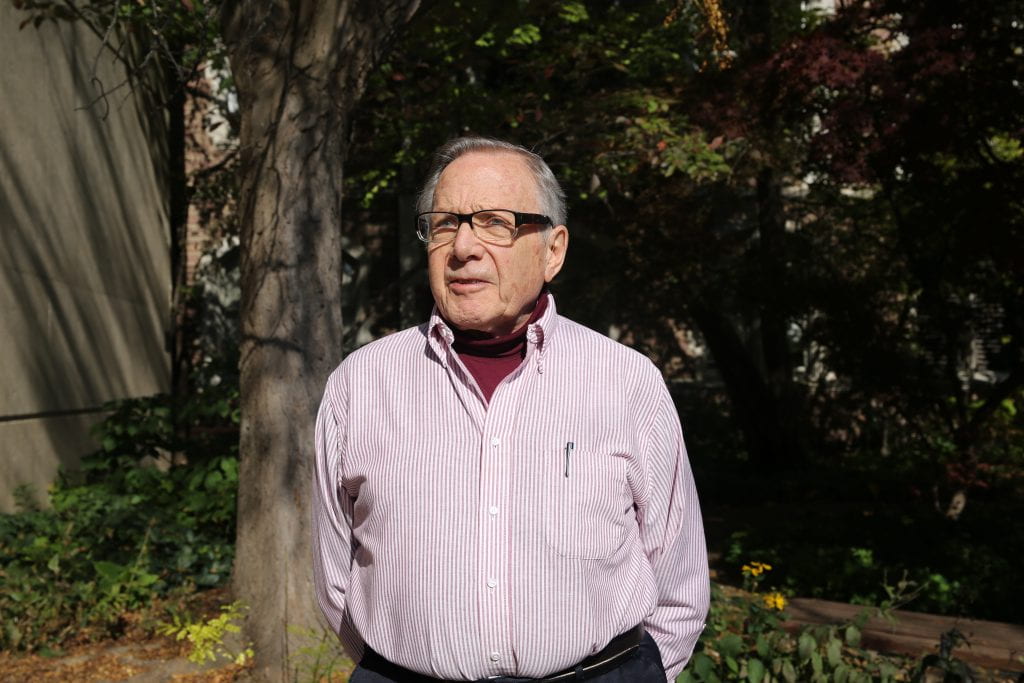When David Kirk was leaving for college, his father had some parting words for him – professors would try and teach him about evolution and he wasn’t to believe a word they said. The advice wasn’t completely unexpected. Kirk’s dad was religiously ultraconservative.
Kirk, professor emeritus in the Department of Biology in Arts & Sciences at Washington University in St. Louis, didn’t heed the parental warning.
“I discovered an entirely new world in college. I’ve been living in an evidence-based world ever since,” he said. “It makes all the difference.”
Today, Kirk commits his time and money to improving evolution education. In partnership with the Institute for School Partnership (ISP) at Washington University he supplies the books for Evolution Education Book Club, leads the Darwin Day celebration and funds the David and Marilyn Kirk Teacher Fellowship, which supports a local leader in evolution education.
Current ISP Kirk fellow Heather Essig, who teaches sixth-grade science and AP biology at Visitation Academy, an independent, Catholic girls’ school, said Kirk has been an amazing mentor and resource to a huge number of teachers in the area.
“It’s wonderful to think of all of the students whose education has been enriched by programs supported by Dr. Kirk,” she said. “Teaching science is such an amazing job and Dr. Kirk has provided excellent programs to help busy teachers keep up with advances in evolutionary biology.”
In particular, she enjoys the evolution book club.
“It is so much fun to hear stories about all of the researchers he has known and worked with in the field of evolution. His stories bring the process of science to life and every meeting I am able to grab things that I use in the classroom and that also enrich my understanding of evolution.”
Kirk spent his career teaching developmental biology and doing research on the evolutionary origins of multicellular organisms. In retirement, he now devotes his time to making sure evolution is a key part of a sound K-12 science curriculum.
It’s quite an about-face for a man who grew up in an anti-evolution family. Kirk’s father wanted him to become a medical missionary and go to Africa to convert nonbelievers. That required going to college. Enrolled at Northeastern University in Boston, Massachusetts, he signed up for pre-med and got into a research lab at Massachusetts General Hospital.
“I never knew what science was until I got into a cutting-edge research lab,” he said. “I don’t think any of us realize in advance what the things may be that turn our lives around.”
World authority on sweating
After finishing up graduate school in Wisconsin, Kirk, now married and a father, found himself “in substantial debt,” so he took an industrial research job in New Brunswick, New Jersey, where he boasts he became, “unwittingly and unwillingly the world authority on underarm sweating.”
He was initially hired to develop a skin developmental biology research program, but on his first day he was told a temporary emergency meant he was needed elsewhere in the company.
“We don’t have anyone to run our sweat lab right now, so we want you to run our sweating program,” he recalls the boss telling him.
The lab was full of gurneys. The temperature was 95 degrees with 95 percent humidity.
“We had Rutgers University students, and we were able to pay them enough that they would sweat forever,” he said. “I developed the world’s largest collection of photographs of sweaty armpits.”
The purpose of the program? He was working on a new way to deliver deodorant.
While the salary was great, Kirk was miserable. After a year, he left for a postdoctoral position at the University of Chicago. After moving from Chicago to Washington University in 1969, he and his late wife, Marilyn, spent many years investigating the genetic basis for the evolution of the spherical, multicellular green alga called Volvox from a unicellular ancestor called Chlamydomonas.
Misconceptions of teaching evolution
Polls show that many teachers who accept the importance of evolution do not incorporate it in their classes at all or reduce it to one lecture because they are afraid.
“And yet, we know you can’t teach 20th-century biology, let alone 21st-century biology, without evolution. It’s like trying to teach physics without gravity or chemistry without atoms,” Kirk said.
The ISP annually offers a free program called Darwin Day, which equips K-12 science teachers with the confidence and skills to teach evolution. This year’s event will be held Saturday, Feb. 11. Timed to the anniversary of Darwin’s birth — the 208th this year — the event features workshops, lesson plans, presentations and cake.
“A birthday party is a fun way to broaden our reach,” said Essig. “Darwin Day is great because it connects teachers to the recent science and gives us an opportunity to network and share ideas.”
This year’s Darwin Day keynote address will be delivered by Briana Pobiner, research scientist and museum educator at the Smithsonian’s National Museum of Natural History in Washington, D.C. Her presentation is titled, “The Paleodiet: What Our Ancestors Really Ate.” She’ll discuss facts, fallacies, and fantasies in our understanding of prehistoric diet. Following her talk, Gautam Dantas, associate professor of pathology and immunology, of biomedical engineering and of molecular microbiology at Washington University School of Medicine, will discuss the role of evolution in medical practice. His presentation is titled, “Combating Antibiotic Resistant Superbugs Across Diverse Habitats.”
January 2017 | by, Myra Lopez
